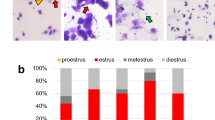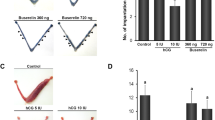Abstract
IT has long been established that delay of implantation may occur in lactating mice. Recently, it has been noticed that delayed implantation may also occur in super-ovulated females kept in conditions of mild crowding. Twenty-two female mice (TT strain) were placed, when aged about 30 days, in a cage measuring 24 in. × 14 in. × 7 in., which had one drinking and one eating station. They remained in this cage for the duration of the experiment. When the mice were 59 days old and weighed 30–35 g, the super-ovulation procedure was commenced. This consisted of injecting, intraperitoneally, 3 I.U. pregnant mare serum (‘Gestyl’, Organon) and 3 I.U. human chorionic gonadotrophin (‘Pregnyl’, Organon), the former 43 h, and the latter immediately, before mating at noon on day 0, when 7 males were put into the cage containing the 22 females. The males were removed at 9 a.m. on the first day and the number of females having mated, as evidenced by the presence of vaginal plugs or spermatozoa in the vaginal smear, was noted.
This is a preview of subscription content, access via your institution
Access options
Subscribe to this journal
Receive 51 print issues and online access
$199.00 per year
only $3.90 per issue
Buy this article
- Purchase on Springer Link
- Instant access to full article PDF
Prices may be subject to local taxes which are calculated during checkout
Similar content being viewed by others
Author information
Authors and Affiliations
Rights and permissions
About this article
Cite this article
DICKSON, A. Delay of Implantation in Super-ovulated Mice subjected to Crowded Conditions. Nature 201, 839–840 (1964). https://doi.org/10.1038/201839b0
Issue Date:
DOI: https://doi.org/10.1038/201839b0
Comments
By submitting a comment you agree to abide by our Terms and Community Guidelines. If you find something abusive or that does not comply with our terms or guidelines please flag it as inappropriate.



